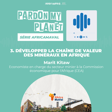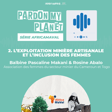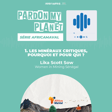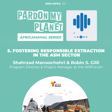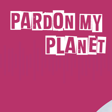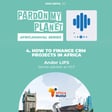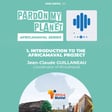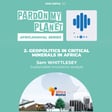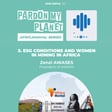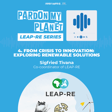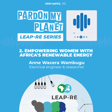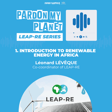Become a Creator today!Start creating today - Share your story with the world!
Start for free
00:00:00
00:00:01

Quality & equity in electricity access across Africa
This episode explores the critical issues of sustainability and equity in electricity access. Marine Cornelis, an expert in energy policy and public affairs, discusses her work on the EURICA project in Madagascar and Burkina Faso, two regions facing significant yet different energy challenges. Marine’s insights into the practicalities of providing quality electricity access offer a sobering look at the hurdles that remain in the quest for energy equity.
More information on: lgi.earth/podcast
Transcript
Introduction to Pardon My Planet and Renewable Energies in Africa
00:00:09
Speaker
Hello and welcome to Pardon My Planet podcast. I'm Anshaloti, your host. This episode is part of a series on the development of renewable energies in Africa. Two episodes are already out. so You can listen to them on major platforms and on lgi dot.earth website. The challenge of sustainability for electrification is not only about the type of energy sources you use, it's also being smart about how you develop the access to the energy and make sure it's adapted to the people who end up using this ah electricity.
00:00:42
Speaker
It's a crucial question for sub-Saharan countries as it gathers around 70% of the world's population without access to electricity, according to the World Bank.
Guest Introduction: Marine Cornelis and Her Contributions
00:00:52
Speaker
To dig deeper into this subject, we welcome to the Marine Cornelis. She is the Executive Director of Next Energy Consumer, a policy and public affairs consultancy. She contributed to the Eureka project in Madagascar and in Burkina Faso, part of LIPRI, the Long-Term Joint Research and Innovation Partnership on Renewable Energies. Marin is also an EU Climate Pact Ambassador and Fellow Podcaster, hosting an energetic podcast, which makes me even more excited ah to welcome her today. Hello, Marin.
00:01:26
Speaker
Hi, I'm Charlotte. How are you today? Good, good. And you thank you also for being on the show. Thank you so much.
Eureka Project: Enhancing Energy Access in Madagascar and Burkina Faso
00:01:33
Speaker
You went in these two sub-Saharan countries with the Eureka project in Northern Madagascar, in the Ambanja district and in Burkina Faso. in Wagadugu, the objective is to facilitate the access to energy and electricity quality. But why there? And what are the specific challenges that they face, maybe starting with Wagadugu?
00:01:58
Speaker
yeah Yeah, so interestingly, and our partners in the project already had some contacts. It was really interesting to to build on something that was already existing.
Challenges in Wagadugu: Urban Growth and Electricity Issues
00:02:08
Speaker
um But Wagadu and Ambench actually, the so our two pilot projects, they are, let's say, really good examples of the challenges that Sub-Saharan Africa is facing because On the one hand, in Wagadugo, it's a booming city. it's really ah like The city is growing so fast. The populations add up like every day. Every day new people come in, and every day more people want to have access to electricity and to the opportunities that are offered by your city. But the network that exists out there
00:02:44
Speaker
is not strong enough to cope with those extra activities, those extra needs and requirements of the population. um So interestingly, the idea was is really to to boost the quality of the the supply of electricity out there, um for instance by um making sure that at the ah the network doesn't make any blackouts. Because if you have blackouts, at the end of the day, you need backups. And the backups, very often they are through a gen ah set generators, so ah diesel generators, and that is hugely problematic. And in the meantime,
00:03:23
Speaker
You have also the national grid that is heavily ah reliant on fossil fuels, whereas Sub-Saharan Africa, it has a lot of sun as well.
Innovations in Madagascar: Nano-grids and Tailored Electricity Access
00:03:33
Speaker
So the idea is really to improve the quality of the electricity that is supplied. On the other hand, in Amband, the ah local partner, Nanoi, had been already building some really interesting infrastructures, tiny, I mean, not comparable to what you can see in ah big cities like like Wagadu. But interesting because the Amban district is a very rural district. It's also um very affected by climate change. So, you know, you need really, let's say, versatile and resilient um infrastructure that are still able to deliver for the people who live there.
00:04:10
Speaker
So the partner out there was is already developing what's called nano-grids, so um let's say grids, um providing electricity to only a few houses connected between each other. And the idea is not to supply electricity 24-7, but provide a few hours of electricity, but high-quality electricity. And in that case, it also makes a difference because many people in rural Madagascar and it's the case in many, many places in rural Africa
00:04:41
Speaker
They spend their time ah like daytime outdoors so they don't really need electricity indoors. So actually the families enjoy having electricity in the evening. um So they share the burden of having solar panels, a grid and say a battery to ensure this supply. And um at the same time, they know that they won't face any blackout as well. Yeah and that's really interesting because when we think about electrification the first thing that comes to mind is you almost bring the cable right and then you can plug and that's it and everything works but it's much more complicated than that and as you said there are neurons and it's very interesting this
00:05:20
Speaker
usage of electricity that is not equal everywhere to adapt. Is it also what you mean? um Because you refer in your work as ah being human-centered and this focused as well on justice. Maybe can you elaborate a bit on this and explain to us what is the relation with the like electricity access? yeah so um Very simply, access to electricity, access to modern electricity service, access to quality electricity is a question of life of death. But we tend to overlook that, especially in European context. In in developing countries, the situation is really different, meaning that um i mean maybe we will think of providing electricity for
00:06:03
Speaker
you know as as a benchmark, as really a box to tick, but it's actually ah really different than that. It has to be tailored to the needs of the population. And for instance, um there is little sense in certain countries to provide electricity to schools because kids will study outside and they won't study at night. ah Whereas ah it makes a lot of sense to be sure that the quality the electricity and is provided into hospitals, or clinics, and it has also high quality, high value. um One of let's say of the most striking elements I have been um saying in my in my work and my research is um you know the the disparities you have between the most ah wealthy part of the population, which can afford going to hospitals and clinics that are supplied 24-7,
00:06:58
Speaker
Maybe they rely on gen sets, but the question is not that. They will have access to high-quality electricity all the time, whereas ah the poorest part of the population, they will not access that. And they will get any, let's say, a routine procedure, and maybe they will get ah even thicker or they will die because the the electricity shut down during this procedure. And that is simply not acceptable. Electricity access shouldn't be only about taking a box, you have access or you don't have access. It's really about the type of electricity that is provided and how reliable it is.
00:07:34
Speaker
So you will, there are some some frameworks, some roadmaps that have been developed ah that explain like the different levels of access to electricity. Let's say the first will be lighting a light bulb for a few hours a day. Okay. Charging a phone as well. I mean, it's it makes a lot of sense. And then you will have a higher quality, a higher quality, meaning ah let's say using a fridge. um at least for a few hours a day if you're a fisherman.
00:08:06
Speaker
fisherperson, you can store the fish and then sell it later and not ah only be in like in the moment. And so, you know, it's like an investment you make in in the longer term, it it really improves the quality of your, ah let's say, of your life and of your income as well. And then you have electricity for, let's say, ah the highest level will be for industrial uses as well in developed countries, you really have this what is called level five of the roadmap, which is ah electricity really abundant at all time of days. So but it's really important to keep a look on where the people are at and what their aspirations are. ah Also, ah because if you build two big infrastructures, first, it may not fit the needs, ah the current needs of the population, So second, it's if it's too big, it ends up costing too much. Not only costing too much at the moment you build the infrastructure, but also the maintenance cost. And, you know, there those underlying costs that don't really appear at the moment. And that ends up costing to the local population. So that's really important to
00:09:23
Speaker
make a step back and you know think really slow, analyze all the elements and then act quite faster on on delivering ah for the people who need it because again it's a question ah of life or death. but So you just said that you take into account the needs and that are ah needed now, which is logic, but do you take into account also the future needs as the population keeps growing and maybe the needs also are evolving? The world is more and more globalized and we tend to see the same tendencies to want the same things. ah How do you take this into account?
YuriCap Project: Digital Solutions for Energy Optimization
00:10:01
Speaker
Yeah, so that's really one of the key points of this YuriCap project because ah it's about developing some ah digital products that allow to monitor in real time the energy consumption and also the energy production coming from, let's say, solar panels. um And that's really interesting because this way you can actually see whether the grades you already have, the resources that you already have, have are optimized or if they can be boosted. it's It's, you know, it's a real-time diagnosis of the situation. And I think it's one of the things that is the most forward-looking somehow. Because maybe today in that area we have, let's say,
00:10:45
Speaker
But tomorrow, maybe they will also have electric vehicles. I don't say electric SUVs, I say electric three-wheelers, for instance, that are like the majority of the new vehicles that are put on the roads in India, for instance. So they will also arrive in Africa and they will need some electricity somehow and maybe a lot of electricity. So it's really important to be able to, you know, make a picture and try to understand what is at stake. um So that's um that's really why, you know, I think somehow this kind of investments, they can be a little bit scary or daunting to have this kind of monitoring. But at the same time, they benefit the greater good because they are they allow to optimize the resource. And that's also something that, ah you know, in in Europe and in the US is known as ah sufficiency, not only making sure
00:11:41
Speaker
These systems are efficient, like delivering and not wasting too much, let's say, ah resource money and so on, but also sufficient, which is about optimizing what we already have. When you say a bit scary or a bit daunting, is it something that you experience implementing these disol solutions of monitoring? So, and getting back to the EuroCAD team, yeah, let's say that there were three um tech oriented organizations, and then there was a DSO, the local DSO of Madagascar, and um there was also a ah research center from from Cameroon, and then there was me also working with this research center, sociology center ah in Cameroon.
00:12:27
Speaker
And um interestingly, when the solution was being developed in Wagadu, the idea of was to install some smart plugs in the home to monitor the consumption of certain appliances, such as the cooling appliances, air conditioners and so on. Why? Because in Madagascar, the um blackouts, I mentioned earlier,
Cultural Sensitivity in Technology Introduction
00:12:51
Speaker
the blackouts happen in particular during the the the summer period when people use a lot of electricity and they use it all at the same time, putting too much pressure on the grid. And then the the grid goes, um it it basically collapses and it takes hours to get back. And in the meantime, really people feel too hot in their home. So it situation that is really complicated.
00:13:15
Speaker
ah for for everyone, not only ah sick people, but also, ah but really everyone. ah So the idea was to say, okay, we have a special focus on those kinds of appliances because they are the most energy-hungry appliances made this way. um And let's see what we can do. Let's see if there is a way to um to maybe implement some micro cuts of those appliances. So some colleagues went there and said, okay, we're going to implement some tools that will control those appliances. And then people were like, no way. i don't want I don't want to be controlled. I don't want my house to be controlled. My privacy is important to me. And of course, your privacy is important to you. Of course, you don't want anybody to control. Nobody wants a big brother in their home, right? um not Not in Europe, not in not in Africa. It's a question of, it's a human decency, it's a human right to privacy, right? But let's say that um some of the approach at was that is very tech oriented sometimes gets over enthusiastic about certain ways of doing things.
00:14:34
Speaker
So i in the conversation, I said, did you try using the term monitor instead of control? Because monitor, it puts way more agency into the person. like You can still override the system if needed. You can still, um nobody is gonna plug in and plug out for you, but you still have like a a human ah take on it. You can still like do what you want in your home and nobody is spying on you, right? And then from that moment, I mean, it was also a wake up call and an eye opening experience actually for my tech colleagues because they realized that they were not using the right um approach towards local population.
00:15:17
Speaker
Right. And to present ah what they were actually doing and it was not about control but yeah you do the words I'm meaning. yeah Exactly. And that's why it's really important and I really ah really appreciated this this project as well because ah it's it was really about ah trying to also learn from each other. And you know I think one of the the the key takeaways is that um there is, first of all, no one size fits all, and you really need to talk to the local population to see what they need, what they expect. But also that if you want to deliver the energy transition that is fair, inclusive, and just for everyone, you need people with different backgrounds on board.
00:16:01
Speaker
um So me as ah with my background as let's say a policy consultant and ah really focusing on the human side of the energy and climate transition, whereas ah my colleagues they focus on a more tech side and together we deliver something better because we We are able to talk to each other, right? ah But if we stay in our bubble, of course, we will make mistakes like all the time. And i mean mistakes are important. We'll learn from from them as well. But it's it's also about ah but making sure that
00:16:35
Speaker
We think together, we grow together, we recreate things together and also with the local population and not only for the local population. Yeah, that that's a very interesting take and also I guess also this there is this notion of change that it can be scary for everyone universally, right? And did you did you get also this type of concern ah in Madagascar or was it a different approach because ah basically you had not to start from scratch, but it was a very different approach. ah How did you feel between the two, the different? I mean, in Madagascar, the situation is is way is way more different because it's um it's, as I said, it's a rural context where actually
00:17:21
Speaker
the ah providers there, the the partner and nanoway is providing electricity as a service, which is a very interesting ah approach, because basically it also puts the needs of the population at the centre, like the yeah the the local population is associated to the development of those nanogrades and people decide to sign up for a certain amount of products. Let's say for instance ah um a charger for their phone, a small 12-volt television, maybe a fridge, and you know coming into the conversation something that came up as well was
00:18:01
Speaker
people want ventilators. They really want some, not some AC systems, but really ventilators because they weren't planned in ah in in the original picture. And ah those are really by talking to the people and say, okay, do you would you need something more that that you deliver, actually, but before something made better and more tailored to to the needs. But in both cases, I mean the i would say that the si the the situation, yes, it looks very different. But at the end of the day, you know I'm a mom myself. And i was I was chatting with parents, um well, moms in particular. And I could see that you know there is this universality of wanting to deliver something really better for our kids. And um that was really, really moving for me to just be able to to to talk with a fellow mom who was like, okay, and you know, sometimes I would just like to put my my kids in front of the televisions for a few hours because I need to run some errands. And I was like, oh yeah, but I'm guilty the same, like it's it's very universal, right? yeah you Just, yeah. I mean, and that's that's what it is.
00:19:15
Speaker
I mean, I felt extremely inspired by the the people and the conversation I had during ah the whole project because I really felt that um this um energy transition and the tools that we're implementing is an opportunity to um to bring people closer and not bring them apart. And maybe also to learn from each other because ah ah the what would it be in Europe that would be interesting to implement or to ah learn from this experience?
Lessons Europe Can Learn from Africa on Energy Consumption
00:19:49
Speaker
Yeah, so ah there was in particular one element that I found extremely striking is you know the fact that um in Wagadugo, for instance, the ah peak energy consumption come in the summer.
00:20:04
Speaker
um In Europe for the time being it comes in the winter ah because our winters are colder but with climate change we are getting closer and closer to having heat waves more and more heat waves and longer heat waves and ah let's be honest um the heat is way more dangerous than the cold in our homes for all the people and so on so we need to get to let's say um somehow inside, we need to to get to ways of monitoring the energy consumption and making sure that it it doesn't um that we keep a certain level of thermal comfort in our homes. writes And um for the time being, we Europeans tend to completely overlook that.
00:20:51
Speaker
the sense that we've been used to having cold winter and mild warm summer but our homes are really not tailored and our grid systems are really not tailored to hot summers. I mean we have um Our homes become way too hot in the summer. we Many, many ah people don't have a good shades. And many people many people are getting, um whenever they realize that they actually need ah to their homes to be cooler, they will invest in an air conditioning system. Air conditioning systems, we it's already visible in India. Air conditioning systems are extremely energy-hungry.
00:21:37
Speaker
And that's why in Ouagadougou you have these blackouts in the summer, because everybody plugged them at the same time. So in Europe, we really need to learn from those experiences ah that basically we need to make sure that the houses somehow stay cooler during the day, ah that our AC systems um don't run all at the same time, and that our grids need really to monitor the situation live to make sure that we don't face blackout either. And again, blackouts.
00:22:11
Speaker
It's a question ah of life or death. Are those tools already kind of implemented or do you feel that we are still ah lacking in Europe of this type of planning?
Europe's Strategy for Grid Digitalization and Energy Delivery
00:22:21
Speaker
So Europe is already thinking of that. There was last year a um strategy or at the end of 2022, a strategy on digitalizing the grid that was released. So there are some really some some ideas to move forward, but I'm not sure that we are going fast enough. um And, you know,
00:22:46
Speaker
It's not only, again, a question of avoiding blackouts, it's also making sure that we are never on the brings of a black cat ah for blackout, you know, making sure that we already, that we have this content supply. And, you know, I mentioned earlier, your electric vehicles, well they are also getting into the European grids and they're also putting pressure. So it's about also kind of making sure that our habits change, but also the infrastructures we have enable us to set and forget Basically, that we don't don't change our habits too much because we're as used to things in a certain way because we are also an aging continent and it's it's sometimes it's harder to change when when you when you get older. so it's and we We're used to a certain level of comfort. so Let's say ah some some of those strategies for to digitalize the grid, to make sure that electricity delivers better um and that we improve overall the quality
00:23:46
Speaker
ah over quantity and the quality and quantity like together is, those strategies are getting developed at the moment, but we need to get faster on this
Conclusion and Promotion of Energy Ethic Podcast
00:23:57
Speaker
as well. Thank you, Marlene, for answering our questions. It was really a fascinating talk and I strongly ah advise our listeners to go and listen to your podcast, Energy Ethic, pun intended. ah We filled with ah great discussions and portraits around climate justice and energy transition. ah It's really fascinating talk, so please go listen to it. Also, we put all the information on it, on Lipri, on Eureka project, on lgi.earth.com. Thank you very much, Marine. Thank you so much, Anshalaat. I had a really a great time, and please listen to all the episodes of Energetic.
00:24:35
Speaker
and We also had a conversation with Nanoi in Madagascar. Please check it out. Thank you so much. And to our listeners, until next time. Bye bye.
